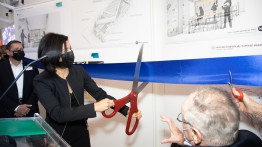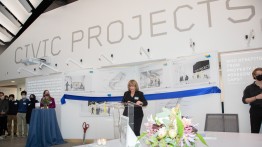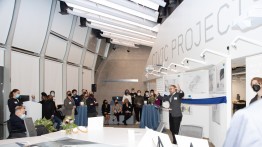Unveiling the Benjamin Menschel Civic Projects Lab
POSTED ON: January 10, 2022
Marking a significant step forward in its historic commitment to educating active citizens, The Cooper Union introduced its newest public space at a ribbon-cutting in November. The Benjamin Menschel Civic Projects Laboratory will be an all-in-one classroom, workspace, and public showcase for interdisciplinary projects aimed at civic-focused issues. Designed to facilitate engagement with the broader New York City community, the lab can be viewed and entered from Third Avenue where it anchors one corner of Cooper Union’s academic building, 41 Cooper Square.
“We need architects, artists, and engineers to think about their work through the lens of how it can better the community in which they work and live. This Civic Projects Lab will provide the space and infrastructure for students to practice their work across disciplines in this way,” President Laura Sparks says. “When I asked students a few years ago what kind of space they would want for themselves—outside of their classrooms, studios, and labs—they wanted a multi-disciplinary workspace where they could problem-solve, imagine, and make things together.”
Formerly occupied by a private preschool, the space became available in 2019. And so, Method Design, a studio in Manhattan’s Financial District, was commissioned by Cooper for a proposal to reimagine it as a hybrid work and exhibition space. Following the design proposal, which was delivered in December 2020, the Civic Projects Laboratory was constructed around three “zones.” The most public of these, just inside the large, street-level windows, acts primarily as meeting space, with seating and tables of different shapes that, if desired, can be fit together to form one unit. The zone furthest from the windows has standing workbenches for collaborative production. The two zones are separated by the third presentation area made up of a sectioned pinup wall. The sections can pivot to allow traffic between the front and back. Additional presentation space is provided via an undulating surface hanging from the ceiling, where images can be projected.
“I have wanted to repurpose this street-level space for student use since I began at Cooper Union,” says Sparks, “but with our financial Plan to Return to Full Tuition Scholarships, I knew that would not be possible without the support of a donor who could envision the impact a place and concept like this would have on our students' learning experience and the city of New York.”
The concept and design were presented to the Menschel family for possible funding. The fit seemed natural. The Benjamin Menschel Fellowship Program to Support Creative Inquiry, established in 1994, has long been a driving force in interdisciplinary student research at The Cooper Union. Further, the Menschels previously funded physical spaces at the college including the Benjamin Menschel Common Room in the student residence hall. The Civic Projects Lab now provides a dedicated space for the kind of pedagogical undertakings that are foundational to Cooper’s mission of inspiring students to address critical societal challenges.
Additionally, the idea for a Civic Projects Lab grew out of an increasing interest among students in project-oriented, locally focused, interdisciplinary learning. One such class, Data Science for Social Good, taught by Sam Keene, professor of electrical engineering, began in 2018. In it, students from all three schools partner with local nonprofits to analyze important issues through data. Through their projects, students have collaborated with City Harvest, FeedNYC, Center for Employment Opportunities, and Coalition for the Homeless resulting in works that have focused on subjects like identifying key predictors of tenants at risk of eviction and analyzing wait times for government aid. Such projects have distinct deliverables provided to partner agencies. Thus, the students whose passions lean toward data analysis and algorithm-building collaborate with students whose passions encompass design and artistic interpretation. But finding a space where such works can evolve has until now been a challenge.
“Cooper students had a keen interest in having a space like this, so we made sure that they, as well as faculty and staff, were integral to its design process,” says Natalie Brooks, the school’s chief talent officer who led the planning of the new facility. “From providing input on how the space could be used to weighing in on the most comfortable work stations, student sensibility was at the forefront of the Civic Projects Lab design. We are excited to see this space become activated with meaningful student-led projects.”
Looking ahead, a flagship program of the Civic Projects Lab will be an investigation into a different, specific question of civic importance for the city each year. Every incoming first-year class will work with upper-class students to identify a signature question to be posed to the full Cooper community. Students will have an opportunity to work across disciplines to make work in response to the question, culminating in an annual symposium and community exhibition that will be open to the public.
“The Civic Projects Lab is an important evolution in Cooper’s longstanding tradition of nurturing dialogue with the public,” says President Sparks. “For over a century and a half, Cooper has provided New Yorkers with a forum for debating ideas and rallying for social change. Now, the Civic Projects Lab can build on that legacy in exciting ways. I look forward to seeing the creativity, skill, and knowledge that Cooper students will undoubtedly bring to the issues they care most deeply about.”
The Civic Projects Lab will open officially to students later this semester.







